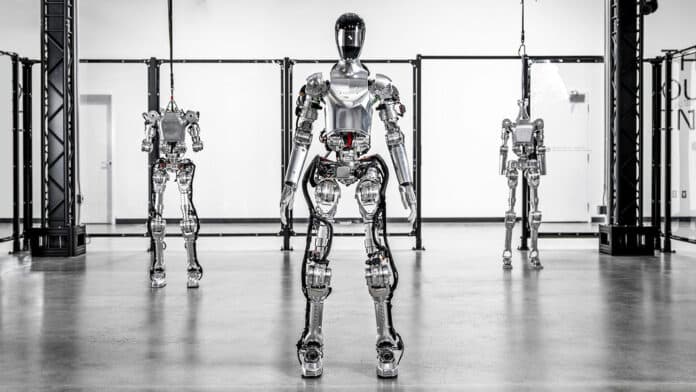Figure, a California-based company developing autonomous humanoid robots, has signed its first commercial deal with BMW to deploy its general-purpose humanoid robots in the car maker’s manufacturing plant in South Carolina.
This is Figure’s first commercial deal since its launch in 2022. The company did not reveal how many robots it will provide to BMW but said that the initial deployment will be small and will scale up depending on the results.
Figure’s CEO Brett Adcock said that the robots would work alongside human workers in various areas of the production process, such as the body shop, sheet metal, and warehouse. The robots will be integrated into various manufacturing processes after being trained to perform specific tasks.
Figure’s humanoid robots enable the automation of difficult, unsafe, or tedious tasks throughout the manufacturing process, which in turn allows employees to focus on skills and processes that cannot be automated, as well as continuous improvement in production efficiency and safety.
The partnership will begin with identifying initial use cases for the robots and will progress to staged deployment at BMW’s manufacturing facility in Spartanburg, South Carolina.
“Single-purpose robotics have saturated the commercial market for decades, but the potential of general-purpose robotics is completely untapped. Figure’s robots will enable companies to increase productivity, reduce costs, and create a safer and more consistent environment,” said Brett Adcock, Founder and CEO of Figure. “We look forward to working side-by-side with BMW Manufacturing to integrate AI and robotics into automotive production.”
Additionally, the two companies will collaborate on exploring advanced technology topics such as artificial intelligence, robot control, manufacturing virtualization, and robot integration.
BMW is not the only car manufacturer that is exploring the use of humanoid robots in its production. Other companies, such as Honda and Hyundai, have also been experimenting with human-like robots for years to automate some of the repetitive and hazardous work in the assembly lines.
Even Tesla, one of the leading innovators in the automotive industry, has been developing its humanoid robot, Optimus. The latest version, Optimus Gen 2, was unveiled in December 2023, and Elon Musk has predicted that there will be a billion humanoid robots on Earth by the 2040s.
General-purpose humanoid robots have been gaining a lot of attention from investors lately. These robots are powered by artificial intelligence software and have the ability to move in a wide range of motion while learning to perform new tasks like humans. Currently, most robots are designed for specific tasks, and it remains to be seen whether a more flexible robot that can perform a broader array of services will be practical in real-life settings.
